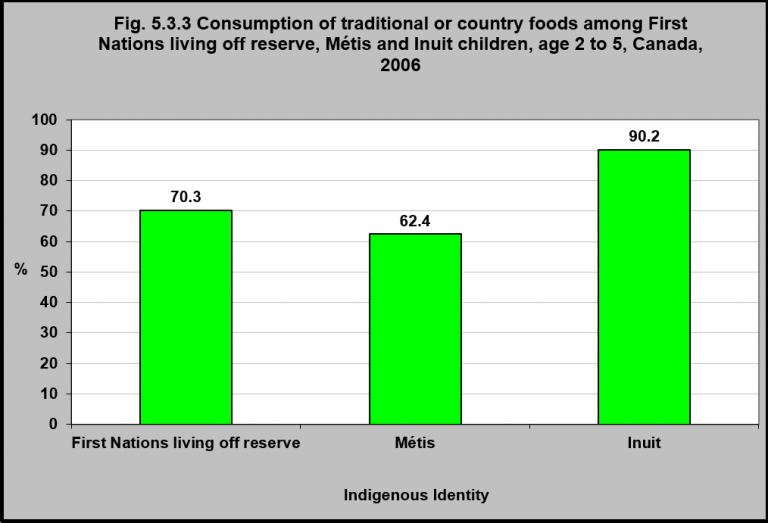Consumption of traditional or country foods among First Nations living off reserve, Métis and Inuit children, age 2 to 5, Canada, 2006

Source: CICH graphic created using data adapted from Statistics Canada. 2006 Aboriginal Children’s Survey. http://www.statcan.gc.ca/pub/82-003-x/2013004/article/11776-eng.htm -accessed August 22, 2017.
In 2006, traditional or country foods were consumed by First Nations children living off reserve (70.3%), Métis children (62.4%) and Inuit children (90.2%) aged 2 to 5.
Fish and large game animals were consumed most frequently.1
1Statistics Canada. 2006 Aboriginal Children’s Survey. http://www.statcan.gc.ca/pub/82-003-x/2013004/article/11776-eng.htm-accessed August 22, 2017.
Implications
Traditional or country foods are an important source of nutrients for Indigenous peoples and obtaining them provides physical activity, an active lifestyle and has socio-cultural benefits. While no comprehensive assessments of nutrient intake have been undertaken with Indigenous children, several studies have found that children who consume high quantities of traditional or country foods have fewer nutritional deficiencies than those who do not.2 Traditional or country food consumption, including plant-based foods such as berries, should be encouraged as part of a healthy diet for Indigenous children.
2See for example, Johnson-Down, L., & Egeland, G.M. (2010). Adequate nutrient intakes are associated with traditional food consumption in Nunavut Inuit children aged 3-5 years. Journal of Nutrition, 140(7), 1311-6; Gagné, D., Blanchet, R., Lauzière, J., Vaissière, E., Vézina, C., Ayotte, P., Déry, S., Turgeon O’Brien, H. (2012). Traditional food consumption is associated with higher nutrient intakes in Inuit children attending childcare centres in Nunavik. International Journal of Circumpolar Health, 71: 10.3402/ijch.v72i0.18401
